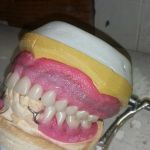
Post-Operative Care for Oral Surgery Patients with Braces: Essential Tips for Recovery
- 1 - Pain Management After Oral Surgery with Braces
- 2 - Diet and Nutrition for Recovery
- 3 - Oral Hygiene and Care for Patients with Braces
- 4 - When to Seek Professional Help
1. Pain Management After Oral Surgery with Braces
After undergoing oral surgery, especially for patients with braces, pain management is a crucial part of the recovery process. Typically, pain and discomfort can occur due to swelling, the surgical procedure, and the pressure from the braces. Over-the-counter pain medications like ibuprofen or acetaminophen are often recommended, but always follow your dentist or surgeon's advice. Additionally, ice packs can be used on the outer cheek area to reduce swelling, but they should be applied in intervals to avoid tissue damage. Keep in mind that pain should gradually decrease over time. If you experience severe or persistent pain, it may indicate complications, and professional consultation is recommended.
2. Diet and Nutrition for Recovery
Maintaining proper nutrition is essential during the recovery phase after oral surgery, especially when wearing braces. Soft foods such as mashed potatoes, soups, smoothies, and yogurt are highly recommended during the first few days. Avoid hard, crunchy, or sticky foods that can irritate the surgical site or damage the braces. Staying hydrated is just as important, as dehydration can slow down the healing process. Incorporating foods rich in vitamins A, C, and zinc can also support wound healing and boost the immune system. Your dentist or orthodontist may suggest certain dietary restrictions based on the specifics of your surgery and treatment.
3. Oral Hygiene and Care for Patients with Braces
Maintaining excellent oral hygiene is more important than ever after oral surgery, especially for patients who wear braces. Braces can trap food particles and plaque, leading to potential infections or complications in the healing process. It is crucial to continue brushing at least twice a day with a soft-bristled toothbrush, but you may need to adjust your technique or use a specialized orthodontic brush to clean around the brackets and wires. Flossing is also essential, and orthodontic flossers or threaders can help make this easier. Rinsing with an antibacterial mouthwash can help reduce the risk of infection, but avoid any harsh mouthwashes that could irritate the surgical sites.
4. When to Seek Professional Help
While most patients recover smoothly after oral surgery with braces, certain signs may indicate the need for professional assistance. If you experience excessive bleeding, increased swelling beyond the typical post-surgery range, or signs of infection like fever or pus, it’s essential to contact your oral surgeon or orthodontist immediately. Additionally, if your braces seem damaged or out of place during the recovery period, it’s critical to have them checked and adjusted. Regular follow-up appointments will also ensure that your healing process is on track.
Post-operative care for oral surgery patients with braces is an important part of ensuring a smooth and successful recovery. By following these essential tips for pain management, diet, oral hygiene, and knowing when to seek help, patients can heal efficiently and maintain the health of their braces and mouth. If you're looking for additional support or products to assist in your recovery, consider speaking to your orthodontist about specific products or tools designed to aid healing after surgery.







 Wilshire Periodontics & Dental5.0 (2 review)
Wilshire Periodontics & Dental5.0 (2 review) Classic Dental Laboratory0.0 (0 review)
Classic Dental Laboratory0.0 (0 review) Lakeview Dental PC4.0 (29 review)
Lakeview Dental PC4.0 (29 review) Grafton Dental Care4.0 (152 review)
Grafton Dental Care4.0 (152 review) Dental Health Associates - Sun Prairie Clinic4.0 (622 review)
Dental Health Associates - Sun Prairie Clinic4.0 (622 review) Honey Creek Dental4.0 (58 review)
Honey Creek Dental4.0 (58 review) The Importance of Oral Health Education During Pregnancy for a Healthy Pregnancy
The Importance of Oral Health Education During Pregnancy for a Healthy Pregnancy Best Tips for Brushing Your Teeth Properly for Healthy Gums: Essential Techniques for Oral Health
Best Tips for Brushing Your Teeth Properly for Healthy Gums: Essential Techniques for Oral Health Why Skipping Dental Checkups Can Lead to Bigger Oral Health Problems
Why Skipping Dental Checkups Can Lead to Bigger Oral Health Problems Advantages of Porcelain Dental Restorations
Advantages of Porcelain Dental Restorations How Can Diabetes Cause Tooth and Gum Problems? Preventing and Managing Oral Health Issues
How Can Diabetes Cause Tooth and Gum Problems? Preventing and Managing Oral Health Issues Healthy Habits for Promoting Good Oral Health and Hygiene: Tips for a Healthy Smile
Healthy Habits for Promoting Good Oral Health and Hygiene: Tips for a Healthy Smile